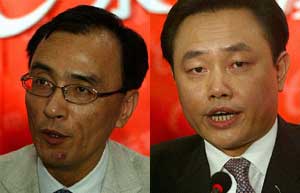'No binding climate deal expected'
By Li Jing (China Daily)
2010-09-30 11:21
|
|
Tianjin talks to focus on narrowing differences and making compromises
BEIJING - China's top climate change official said on Wednesday that countries do not expect to reach a binding climate treaty this year.
Instead, they will focus on narrowing their differences ahead of year-end climate talks in Cancun, Mexico, said Xie Zhenhua, deputy chief of the National Development and Reform Commission.
Xie said the Tianjin round of negotiations, starting next week, will see more agreements than differences in opinions and pave the way to a legally binding treaty that he expects to be finalized in South Africa in 2011.
The outcomes of the negotiations, scheduled from Oct 4 to Oct 9 in the northern port city of Tianjin, will establish the groundwork for the summit in Cancun, but a full-fledged treaty is unlikely to be achieved there, he told a news conference organized by the State Council Information Office.
Last year's climate summit in Copenhagen ended without participating countries reaching a legally binding treaty limiting global emissions of greenhouse gases during the next decade.
Xie said all countries should make "positive and active" commitments to translate the consensus reached at Copenhagen into concrete actions.
"We already have a proposal on the table for long-term cooperative action under the United Nation's Framework Convention on Climate Change. All countries will try to eliminate divergence as much as possible in Tianjin," Xie said.
Xie said the working group for the Kyoto Protocol, which expires in 2012, only has a draft proposal prepared by that group's chairman.
Xie urged countries to begin thinking about making compromises during the upcoming talks.
"To push forward negotiations, all countries should take a more flexible attitude on key issues and make some compromises to achieve an outcome which might not satisfy everybody, but can be acceptable for all. That will be our final agreement," Xie said.
He also urged developed nations to "do more and do better" to significantly reduce greenhouse gas emissions.
Xie added that developed countries should provide financial and technological support to help developing countries tackle climate change.
China, a major greenhouse gas emitter, will continue to adopt stringent energy efficiency regulations, boost use of renewable energy and increase forest coverage to achieve a 40 percent to 45 percent carbon intensity reduction target (from 2005 levels) by 2020.
Details on how to achieve the target will be distributed to businesses and local governments beginning with the 12th Five-Year Plan (2011-2015), and will be mandatory, he said.
As a result, it is impossible for China to set a cap for carbon emissions within a short period of time, Xie said.
The country has already paid a high price in reaching the current goal to improve energy efficiency by 20 percent during the 11th Five-Year Plan (2006-2010), which is already "within reach", he said.
Between 2006 and 2009, small thermal power plants with a total capacity of 60 million kilowatts were closed in China.
Authorities also phased out inefficient production capacity that totaled 87.12 million tons of steel, 60.38 million tons of iron and 214 million tons of cement.
China's government allocated 128.5 billion yuan ($18.9 billion) between 2006 and 2009 for energy efficiency and environmental protection projects. This year's funds are expected to total 83.3 billion yuan.




